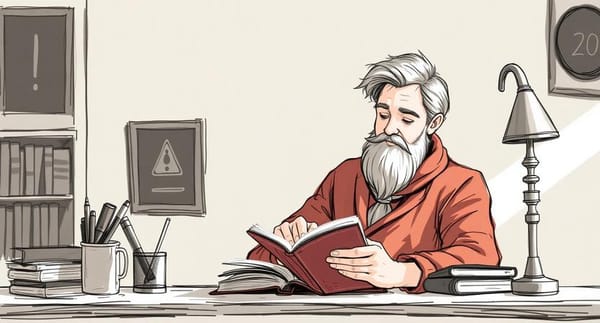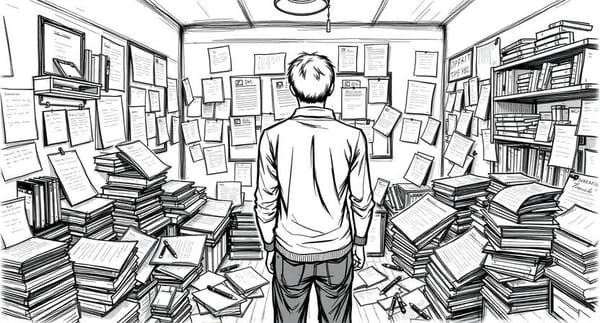Suppressing resistance
Presenting my findings to a larger audience sent waves through the system. But they swiftly faded after crashing against rocks of denial. If I wanted clarity, I’d have to press on.

I honestly don’t know how I pushed through the talk. It was online and only took fifteen minutes, but I put my entire future at risk, and I knew it. This wasn’t an impulsive decision, but a contemplated, deliberate move. Though it was incredibly difficult, I viewed the moment as a chance to rise for scientific principles. I had evidence for my conclusions, and perhaps it could be used to avoid such problems in the future. After all, irreproducible data is incredibly common (the phenomenon is dubbed “replication crisis”), and the field’s experimental nature could prove useful in a case study. It was also an opportunity to address the prevalence of mental health issues in academia. It might surprise you, but my experience was not at all exceptional, as even my most immediate surroundings proved: Within one year, half of my department’s PhD candidates burned out. But I digress.
I disconnected immediately after the talk and went into survival mode. The next one and a half days would serve solely as a break, for tempers to cool, before attempting to reconnect with my supervisor. They didn’t take the attack well; that much was clear the moment I entered their office. They declared my work over and claimed my talk was actionable: This was calumny! It was defamation! Never mind that I had merely pointed to data inconsistencies (which I will still outline, by the way) and drawn conclusions.
I tried my best to steer the conversation back to the project, once again raising one piece of evidence after another. Once again, I invited them to come check the data themself—but, once again, they deflected everything reflexively and emptily: Such elementary mistakes would never occur in their department, much less make it to publication. My allegations were preposterous and unworthy of attention. To this day, my data criticism was never actually addressed, let alone refuted.
Another meeting with another professor was even worse. According to them, “ninety percent of all scientific articles contain flaws so elementary, not even [their] bachelor’s students would make them”. They never explained why their lab would be so exceptional, and despite year-long insight, I never saw any extraordinary quality controls, nor anything else to warrant the claim. If you ask me, it was pure denial, and their ensuing questions solidified my judgment: Was I living alone? Did I have a partner? Did mental health issues run in my family? I guess discrediting messengers is easier than confronting harsh truths.
As I held my talk during a doctoral college assembly, I forced a reaction beyond my supervisor’s insistent ignorance, but it was nonetheless futile. An emergency meeting was held in a questionable format that only amplified the imbalance of power. We were grouped by project (allegedly in the name of efficiency), leaving the students, once again, only across direct supervisors. I was back in the situation I had tried to escape, with an appeal for collective assembly promptly smacked down.
Unsurprisingly, the emergency meeting proved pointless, and absurd. My group consisted of three students, three professors, and zero interest of shielding scientific principles. Anything I said was—you guessed it—immediately dismissed, without evidence or reason, and from there on things just turned…weird. One of the supervisors found it appropriate to question the reality of my concerns by requesting an update on the research of the other candidates. One had not yet begun concrete measurements because their experimental setup proved more difficult than anticipated. The other had gathered results and, when pushed, affirmed that their data should be reproducible if initial blunders were avoided. This was enough for the questioning professor to nullify all criticism—clearly data can be collected and, clearly, it was reproducible. I should mention that my colleague employed molecular dynamics simulations. Computer simulations.
I didn’t know how to respond. An experienced, decorated scientist—with a full professorship, mind you—had just dismissed all reproducibility concerns based on the individual, speculative opinion of one student regarding their own, non-reproduced, simulated data. And neither of the other two (full!) professors seemed to mind. My whole endeavour was obviously a lost cause.
A few more meetings followed, but ultimately nothing changed. I didn’t attend another college-wide discussion during the annual retreat, as I wasn’t going to spend a week surrounded by the factors fuelling my burnout. From what I heard, a few professors were on my side, eager to take concerns seriously and even suggested some improvements. But their opposition, led by my supervisor, resisted any impulse for change. With the PhD candidates all close to graduation, they just needed to play for time, and they knew it. Steadily, the waves of my making ebbed down and, as far as I know, nothing ever improved.
But I couldn’t let things go. I couldn’t just walk away after three years of effort. It ate away at me. For months, I tried to move on, but it was pointless. I still held academia in high regards and wasn’t prepared to give up on the system. In my mind, I had followed procedure: I tried what I could to understand a problem, ultimately identified the issue, and attempted to move forward with the newly acquired knowledge. The gained insights were certainly uncomfortable, but that is simply unimportant. Surely, an objective evaluator would agree. Science is the broadening of perspectives beyond past misconceptions, is it not?
To put an end to my circling mind, I needed clarity. I had to know who was right, which meant forcing my opposition to either refute my criticism, or actually provide evidence for their claims. And only one way could lead there: the university’s ombudsman.




